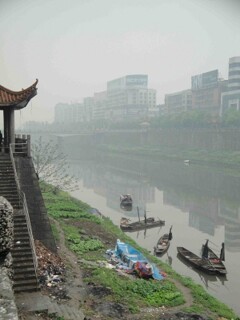China's Big Society
Nick Holdstock
Between 1999 and 2001 I lived in Shaoyang, a small city in Hunan province known throughout China for being dirty. This wasn’t just the prejudice of outsiders; many of its residents complained about the ‘poor conditions’. Rubbish bobbed on the milky green surface of the Shao Shui river, spread along its banks and choked the dam upstream. The street that led to the college where I taught was lined with food stalls, rubbish heaped around them. During the day people would pick through the piles looking for glass, plastic or metal they could resell; at night the rubbish was set on fire. People wiped their chairs in restaurants before sitting down, or carried newspapers to sit on on the bus, but didn’t think twice about throwing cans and tissues out of car windows.
There were occasional attempts to beautify the streets: food stalls were closed, rubbish bins installed. A visit from a minor official would initiate a frenzy of street sweeping. When I went back to Shaoyang in 2010 there was less rubbish on the streets, but the buildings were as dirty as ever. The river was the same colour; walking by the dam I came upon the burst body of a pig. The biggest difference was the number of private cars on the roads, which had been beyond most people’s means a decade ago.
Last month, retirees were apparently authorised to issue on-the-spot fines for spitting, littering and traffic violations. According to Shaoyang’s Urban Management Bureau, the inspectors, who wear red armbands to identify themselves, are paid 500 yuan a month and are allowed to keep 80 per cent of the fines. There have already been reports of overzealous ticketing, with residents complaining of being ambushed by multiple inspectors when stopped in traffic. There is some disagreement among the municipal authorities as to whether the inspectors are allowed to give out fines (the city’s legal affairs office says not), but the offences for which people are being ticketed are not entirely spurious, such as lacking a motorcycle licence or not wearing a helmet. The head of the Urban Management Bureau defended the policy by saying that the city was ‘trying to improve the urban traffic situation without expending too many of the city’s resources’.
If the scheme continues, it may lead to some small improvements and generate revenue. In 2008 there was a similar, much larger scheme in Zhuzhou (also in Hunan); 18,299 inspectors collected 127,000 yuan in fines in just three months. But getting citizens to police each other won’t deal with the underlying causes of environmental pollution, or encourage the 'social harmony' that the government is endlessly invoking.
Besides, littering isn’t Shaoyang’s biggest problem. It is an old town that has had little money spent on its upkeep. Like many other small cities in China, it has missed out on the prosperity that followed the economic reforms of the 1980s (which has been mostly confined to the east coast) and has received far less investment, both domestic and foreign. The private sector hasn’t grown enough to make up for the closure of many state-subsidised industries. The Urban Management Bureau’s decision to employ ‘retirees’ (many of whom are laid-off workers rather than pensioners) may also be an attempt to reduce discontent among the jobless. Unemployment is high in Shaoyang: recent figures suggest that eight out of nine adults of working age are without jobs. Last week an 'early retiree' from a water company in Shaoyang killed three managers in an arson attack, possibly because they did not hire one of her children. When the 12th National People’s Congress convenes in October, one of the greatest challenges that faces the new leaders will be finding a way to close the gap between cities like Shaoyang and those on the coast.
